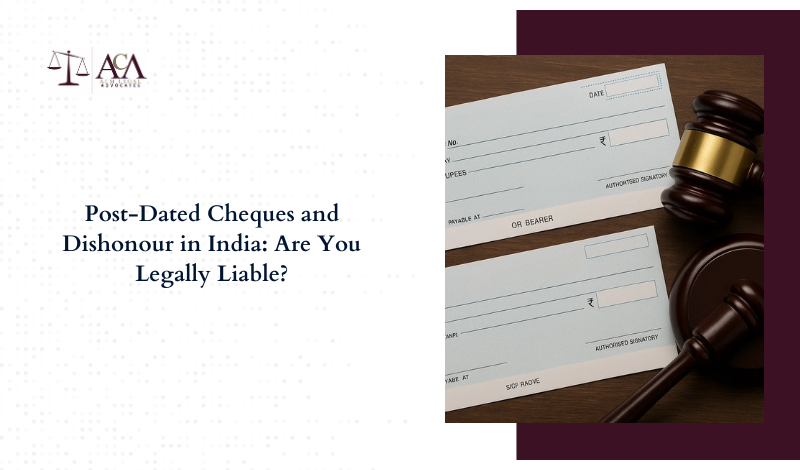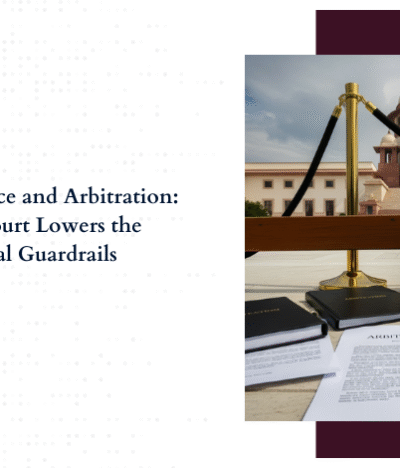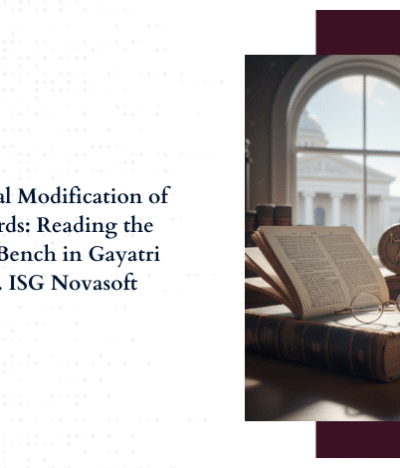Post-dated cheques in India are a common financial instrument in Indian commercial transactions, especially in loan agreements, rent payments, and deferred payment arrangements. While they serve as a convenient tool for ensuring future payments, their misuse or dishonour raises significant legal consequences. The primary legal concern arises when a post-dated cheque is dishonoured upon presentation, triggering potential liability under the Negotiable Instruments Act, 1881.
This article explores the legal status of post-dated cheques, the consequences of their dishonour, and the remedies available under Indian law. It also examines the question: Can one be held legally liable for the dishonour of a cheque issued for a future date? The analysis is grounded in statutory provisions, judicial precedents, and current legal interpretations.
I. Legal Status of Post-Dated Cheques Under Indian Law
A post-dated cheque in India is treated as a bill of exchange under the Negotiable Instruments Act, 1881 until the date mentioned on the cheque arrives. As per Section 5 of the Act, a bill of exchange is “an instrument in writing containing an unconditional order… to pay a certain sum of money.” Once the date on the cheque matures, it becomes a cheque under Section 6 and can be presented for encashment.
The Supreme Court of India, in Goa Plast (P) Ltd. v. Chico Ursula D’Souza, (2004) 2 SCC 235, held that a post-dated cheque, if issued against a legally enforceable debt or liability, is subject to Section 138 of the NI Act upon its dishonour. This makes it clear that post-dated cheques are not outside the purview of cheque bounce laws in India.
Thus, a cheque dishonour, even if it occurs with a post-dated cheque, attracts legal consequences if the conditions under Section 138 are satisfied.
II. Applicability of Section 138 of the Negotiable Instruments Act
Section 138 of the NI Act is the cornerstone provision governing the offence of cheque dishonour in India. It penalises the drawer of a cheque if the instrument is returned by the bank unpaid due to insufficient funds, or if it exceeds the arrangement made with the bank. The section also applies when a post-dated cheque bounces under similar circumstances.
For a successful prosecution under Section 138, the following ingredients must be satisfied:
- Legally Enforceable Debt or Liability: The cheque must have been issued in discharge of an existing debt or liability.
- Presentation Within Validity: The cheque must be presented to the bank within three months (or the validity period, whichever is earlier).
- Dishonour of Cheque: The cheque must be returned unpaid by the bank.
- Statutory Notice: The payee must issue a notice in writing within 30 days from the date of dishonour.
- Failure to Pay Within 15 Days: The drawer fails to make the payment within 15 days of receiving the notice.
In the case of post-dated cheque bounce, once the cheque matures and is dishonoured, the above conditions will determine whether the drawer can be held legally liable.
III. Civil and Criminal Liability for Dishonour of Post-Dated Cheques
The dishonour of a post-dated cheque in India may attract both criminal and civil liability, depending on the circumstances of issuance and the nature of the underlying transaction.
A. Criminal Liability under Section 138
If the prerequisites under Section 138 of the NI Act are fulfilled, the drawer becomes criminally liable, and the payee is entitled to initiate proceedings before a Magistrate. The punishment for cheque bounce includes:
- Imprisonment: Up to two years, or
- Fine: Which may extend to twice the cheque amount, or
- Both
Moreover, the complaint must be filed within one month from the expiry of 15 days after service of demand notice. Courts have consistently upheld that even post-dated cheques, when dishonoured, trigger penal consequences if issued against an existing liability.
B. Civil Remedy under Order XXXVII CPC
In addition to criminal prosecution, the payee can also institute a civil summary suit under Order XXXVII of the Code of Civil Procedure, 1908, for recovery of the cheque amount along with interest and legal costs. This is particularly effective when criminal proceedings are challenged or delayed.
C. Concurrent Remedies
The remedies under criminal and civil law are not mutually exclusive. The complainant can pursue both simultaneously, provided procedural safeguards are observed. Courts have upheld that dual proceedings for the same cause do not amount to double jeopardy.
IV. Defences Against Liability for Post-Dated Cheque Bounce
Despite the strict liability nature of Section 138 of the NI Act, the drawer of a post-dated cheque has certain legal defences available under Indian law. These defences, if proven, can result in acquittal or dismissal of the complaint.
A. Cheque Issued Without Legally Enforceable Debt
A primary defence is that the cheque was not issued for a legally enforceable debt or liability. As held in Indus Airways Pvt. Ltd. v. Magnum Aviation Pvt. Ltd., post-dated cheques issued in anticipation of future contracts or as security are not enforceable under Section 138 if no debt existed on the date of issuance.
B. Cheque Given as Security
If the drawer can prove that the cheque was issued only as security and not meant to be encashed unless a condition occurred, then cheque dishonour legal consequences under Section 138 will not apply. Courts have repeatedly held that cheques given as collateral for contingent liabilities do not attract criminal liability.
C. Material Alteration or Forgery
A cheque materially altered without the drawer’s consent is not enforceable. If the post-dated cheque was tampered with or forged, criminal liability does not arise.
D. Lack of Proper Notice
Failure by the complainant to issue the statutory demand notice within 30 days of dishonour or to file the complaint within the prescribed limitation period is also a valid defence.
E. Post-Dated Cheque Issued Under Coercion
If the accused proves that the cheque was issued under duress, coercion, or fraud, liability under Section 138 of the NI Act may not stand.
V. Judicial Trends and Interpretations
Indian courts have played a pivotal role in clarifying the legal liability for dishonoured cheques, particularly those that are post-dated. Over the years, judicial interpretation has evolved to balance the rights of the drawer and the payee.
A. Cheque Issued as Security – Not Always Liable
In Sampelly Satyanarayana Rao v. Indian Renewable Energy Development Agency Ltd., (2016) 10 SCC 458, the Supreme Court held that if a post-dated cheque was issued in discharge of an existing or future liability, and not merely as a security, its dishonour attracts Section 138. However, where it is proved that the cheque was purely security, criminal liability does not arise.
B. Presumption Under Section 139
Section 139 of the NI Act raises a presumption in favour of the holder that the cheque was issued for a legally enforceable debt or liability. The burden shifts to the drawer to rebut this presumption through evidence or cross-examination, as established in Rangappa v. Sri Mohan, (2010) 11 SCC 441.
C. Advance Payments and Cheque Dishonour
In cases like Indus Airways Pvt. Ltd., the Court clarified that a cheque issued for advance payment or against an unfinalised contract does not fall under the purview of Section 138. This means a post-dated cheque bounce will not attract penal provisions if no debt existed on the cheque’s date.
D. Concurrent Civil and Criminal Remedies
The judiciary has consistently upheld the right of the complainant to pursue both criminal and civil remedies for the dishonour of a post-dated cheque, reaffirming the idea that Section 138 aims to enhance the credibility of cheques in commercial transactions.
How to File a Case Under the Negotiable Instruments Act, 1881
Conclusion
The answer is a qualified yes—you can be legally liable for the dishonour of a post-dated cheque in India, provided the cheque was issued against a legally enforceable debt or liability, and all conditions under Section 138 of the NI Act are met. The law does not distinguish between an ordinary cheque and a post-dated cheque in terms of its dishonour, once it matures.
However, legal liability for dishonoured cheque is not absolute. The drawer has valid defences available, including absence of liability, use of the cheque as security, or procedural lapses by the complainant. Indian courts have adopted a nuanced approach, examining the intention behind issuance, the timing of the debt, and the evidentiary presumption under Section 139.
For individuals and businesses, it is crucial to:
- Issue post-dated cheques only where an enforceable liability exists.
- Avoid using PDCs as mere security without documenting the terms clearly.
- Preserve records of the transaction to defend or assert claims.
Thus, while post-dated cheque bounce can lead to criminal and civil consequences, a careful understanding of the law and proactive legal safeguards can mitigate risks.
Frequently Asked Questions (FAQs)
1. What is a post-dated cheque?
A post-dated cheque is a cheque that bears a date later than the date it is actually issued and is meant to be encashed on or after the mentioned date.
2. Is a dishonoured post-dated cheque a criminal offence?
Yes, if the cheque was issued against a legally enforceable debt or liability, its dishonour can lead to criminal prosecution under Section 138 of the NI Act.
3. Can I be prosecuted for issuing a cheque as security?
Not always. If the cheque was issued purely as security and no liability existed when it was issued, criminal liability may not arise, depending on the evidence.
4. What is the punishment for cheque bounce in India?
The drawer can face imprisonment up to 2 years, a fine up to twice the cheque amount, or both, along with a possible civil recovery suit.
5. Can I file both civil and criminal cases for cheque bounce?
Yes. The payee can initiate criminal proceedings under Section 138 and also file a civil suit under Order 37 CPC for recovery of the cheque amount.






